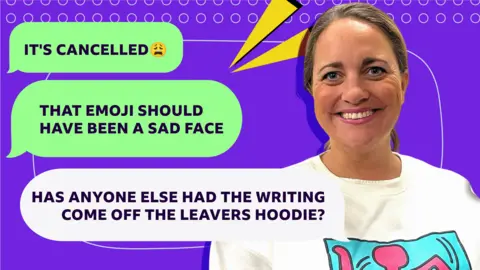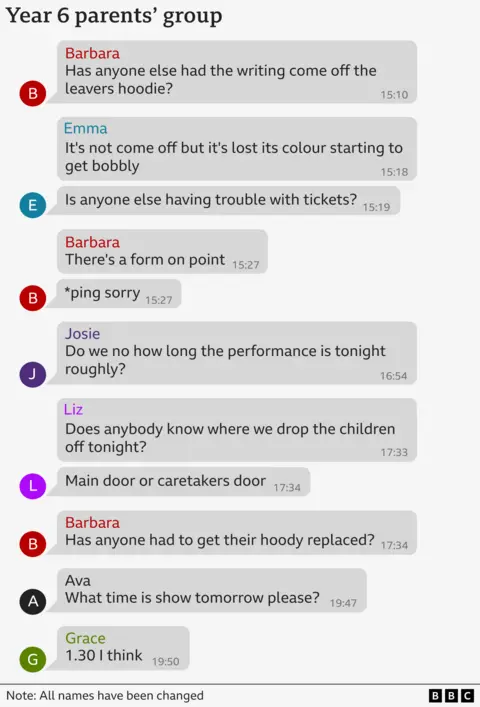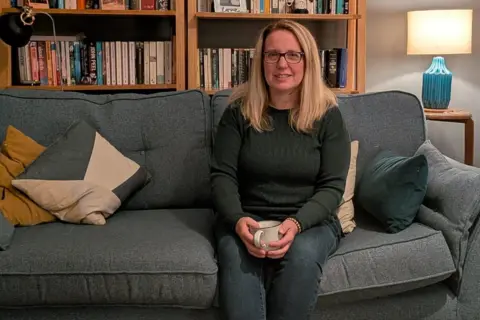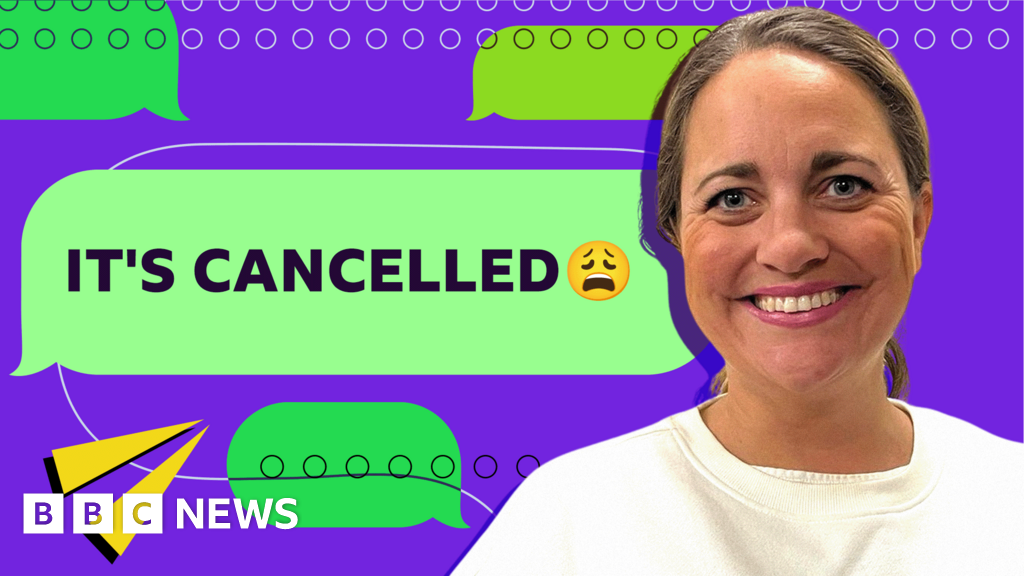Carmel O’Grady and
Laura CannonBBC Parent’s Toolkit
 Claire Berry
Claire BerryThe summer holidays are over and schools have returned – along with the parent WhatsApp groups.
You might have found yourself added to a brand new group for the whole class or even the entire year group if your child has just started school, particularly primary school, or been part of one for a while if your child is older.
Maybe you’re familiar then, with a steady stream of messages – non-uniform day, the sports day, the latest letter from the headteacher, all with a hefty side dose of competitive parenting.
Some parents lap it up, but others are choosing to quit these groups altogether.
‘People wind themselves up’
Claire Berry, from Lancashire, who has three school-age children, chose early on to leave all the primary school WhatsApp groups and says it’s proved to be a good decision.
Claire told us that more than once the headteacher at the school her children attend has had to intervene and email parents about negative things being posted in the chats.
For example, when the school was changing a policy around managing classroom behaviour, she heard the WhatsApp chat became very divisive.
“I really don’t think it’s helpful when between 30 to 60 parents weigh in with their opinion and it’s obviously going to be polarised one way or another,” she says. “Nobody usually comes along on a WhatsApp group with a balanced opinion.”
Claire says this kind of chat causes unnecessary anxiety and is unhelpful for the school, because it becomes a chain of opinions – and “people wind themselves up into a frenzy about something which actually isn’t that much of an issue”.
Another reason Claire decided to decline invites to the group chats is it almost always seems to be mums who are added, meaning they take on the bulk of school communication.
A quick straw poll among the team here in our office also suggested this is the case – with most school parent groups having only a handful of male members.
Claire says being in the group means one parent is left dealing with more school admin; this can create resentment.
“It just disengages somebody – one half of the couple – because they don’t have any of the information,” she says.
“I really just don’t need to be part of that,” she adds. “I don’t need to have that background noise going on… If my kid comes home with the wrong jumper I don’t need to tell 35 people.”
‘The constant notifications’
The volume of messages on these groups can be a real issue for some – one of the team here on BBC Parent’s Toolkit says this summer, she has had endless messages about the correct pleat widths for school skirts, and the right colour socks for PE.
She also points out the groups tend to go deathly quiet when someone asks for volunteers for their school’s parent teacher association (PTA), or when the humble brags start about reading ages, extra-curricular achievements, educational holidays or homemade extra-healthy lunch boxes.
“The constant notifications, it’s so unnecessary,” Claire adds. “Even if you’ve got them silenced and you open your phone and there’s 65 messages.”

On the flip side, other parents often put together a handy schedule at times like Christmas when the school events come thick and fast, and WhatsApp groups are a good place to organise the end-of-year teacher gift, our colleague says.
However, almost everyone has a story about a message ending up in a school group that was definitely meant for someone else – this can be humiliating.
Catherine Knibbs, a human behaviour technologist, tells BBC Parent’s Toolkit these groups can be stressful because they are “enforced systems of communication, you’re being interrupted when you don’t want to be, and nobody sets the rules”.
Her advice for dealing with it is to set boundaries in terms of what you are happy to engage with and use the settings in the apps themselves to help with that.
Have these groups got a role to play?
 Jen Clancy
Jen ClancyJen Clancy from Salford – who has two children in secondary school – takes a slightly different view of school group chats. Until three years ago she was headteacher at Godfrey Ermen Primary School in Eccles, Salford.
Jen tells us communication is a big issue for schools and informal parent group chats can be a good way of making sure those parents who are less likely to read the school newsletter, or check the website, know what’s going on.
As a parent, Jen says she also saw a negative side, such as how vocal parents use the groups to stir up issues, potentially leading to upset and problems for the school.
“I think parents can sometimes forget that teachers are human as well,” Jen says. “We’re not just there to be attacked and to be pulled up about anything, we’re there to be spoken to in a humane way.”
When she was teaching, Jen says WhatsApp groups for year groups of pupils also caused issues, particularly among the older children, if discussions or arguments spilled over into real-life in the playground.
However, when her daughter was starting high school this September – and going to a different school to most of her friends – Jen says the Year 7 WhatsApp group she was added to really helped settle her nerves.
“It made me feel better that she knew lots of people before she’d even started, because that’s always a worry,” Jen says.
Group chat advice
Be selective: carefully choose which groups you really need to be part of for essential information.
Manage notifications: if you archive a WhatsApp group you won’t get interrupted every time there’s a new message, and can catch up on new posts all together when you have time.
Check settings: spend time setting up your app so you can’t be contacted by strangers. You can also choose to only receive an invitation to a WhatsApp group.
Think before you send: behave online as you would face-to-face. Listen more, pause before replying, check you’re replying to the right group.
Keep talking: you can discuss your own experiences with WhatsApp groups or getting overwhelmed or upset about messages with your family.
For further advice on navigating messaging apps, including advice on how to change settings, head to BBC Bitesize Parents Toolkit.

